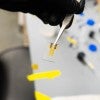
Rice and UH scientists redefine chemical manufacturing method to solve carbon capture problem
A team of scientists led by Haotian Wang, associate professor in chemical and biomolecular engineering at the George R. Brown School of Engineering and Computing at Rice, and Xiaonan Shan, associate professor of electrical and computer engineering at University of Houston, have discovered simple yet elegant solutions to address a fundamental issue in carbon capture and utilization technology.














